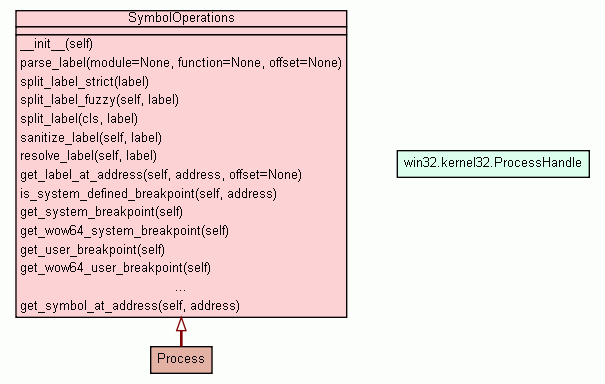
| Home | Trees | Indices | Help |
|
|---|
|
|

Encapsulates symbol operations capabilities.
Requires a ModuleContainer.
Note: Labels are an approximated way of referencing memory locations across different executions of the same process, or different processes with common modules. They are not meant to be perfectly unique, and some errors may occur when multiple modules with the same name are loaded, or when module filenames can't be retrieved.
Read more on labels here: http://apps.sourceforge.net/trac/winappdbg/wiki/HowLabelsWork
|
|||
|
|||
|
|||
| int or None |
|
||
| int or None |
|
||
| int or None |
|
||
|
Inherited from |
|||
| Labels | |||
|---|---|---|---|
| tuple( str or None, str or int or None, int or None ) |
|
||
| str |
|
||
| int |
|
||
| str |
|
||
| Symbols | |||
|
|||
|
|||
|
|||
|
|||
|
|||
|
|||
| Debugging | |||
| bool |
|
||
| int or None |
|
||
| int or None |
|
||
| int or None |
|
||
|
|||
| Labels | |||
|---|---|---|---|
| tuple( str or None, str or int or None, int or None ) |
|
||
|
|||
| Labels | |||
|---|---|---|---|
| str |
|
||
| tuple( str or None, str or int or None, int or None ) |
|
||
|
|||
|
Inherited from |
|||
|
|||
x.__init__(...) initializes x; see x.__class__.__doc__ for signature
|
Creates a label from a module and a function name, plus an offset.
Warning: This method only parses the label, it doesn't make sure the label actually points to a valid memory location. |
Splits a label created with parse_label. To parse labels with a less strict syntax, use the split_label_fuzzy method instead.
Warning: This method only parses the label, it doesn't make sure the label actually points to a valid memory location. |
Splits a label entered as user input. It's more flexible in it's syntax parsing than the split_label_strict method, as it allows the exclamation
mark (
Warning: This method only parses the label, it doesn't make sure the label actually points to a valid memory location. |
Splits a label into it's When called as a static method, the strict syntax mode is used: winappdbg.Process.split_label( "kernel32!CreateFileA" ) When called as an instance method, the fuzzy syntax mode is used: aProcessInstance.split_label( "CreateFileA" )
See Also: split_label_strict, split_label_fuzzy |
See Also: split_label |
Converts a label taken from user input into a well-formed label.
|
Resolve the memory address of the given label.
Note: If multiple modules with the same name are loaded, the label may be resolved at any of them. For a more precise way to resolve functions use the base address to get the Module object (see Process.get_module) and then call Module.resolve. If no module name is specified in the label, the function may be resolved in any loaded module. If you want to resolve all functions with that name in all processes, call Process.iter_modules to iterate through all loaded modules, and then try to resolve the function in each one of them using Module.resolve. |
Creates a label from the given memory address.
Warning: This method uses the name of the nearest currently loaded module. If that module is unloaded later, the label becomes impossible to resolve. |
|
|
|
|
|
|
|
| Home | Trees | Indices | Help |
|
|---|
| Generated by Epydoc 3.0.1 on Fri Feb 12 19:46:25 2010 | http://epydoc.sourceforge.net |